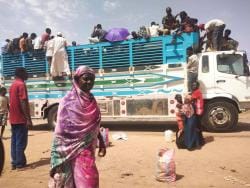Michael Abrahams | What about Sudan?

Source: Jamaica Gleaner
Sudan has had a very violent and unstable history. Since gaining independence in 1956, the country has experienced more than 15 military coups and other conflicts, including two civil wars between the Arab-dominated government and the Christian and animist black southerners, which led to the independence of South Sudan in 2011 and killed over two million people. There was also the War in Darfur, nicknamed the Land Cruiser War, which began in February 2003 and lasted 16 years.
Now, a civil war between two rival factions of the military government of Sudan, the Sudanese Armed Forces (SAF) under Abdel Fattah al-Burhan and the paramilitary Rapid Support Forces (RSF) under Mohamed Hamdan Dagalo (Hemedti) began during Ramadan on April 15, 2023, and shows no sign of abating. As of January, at least 13,000-15,000 people have been killed and 33,000 others injured. Since the beginning of the war, two significant massacres have taken place in Geneina, the capital of West Darfur State, when fighting took place between Masalit and other non-Arab people in support of the army against the RSF and allied Arab militia. The Darfur genocide, the systematic killing of ethnic Darfuri people which occurred during the War in Darfur, and has been recognised as the first genocide of the 21st century, is continuing during this conflict.
Investigations have revealed that the RSF and allied militias were involved in ethnic cleansing, including the raping and sexual slavery of girls and women, in West Darfur. Both the RSF and the SAF have been accused of abuses that might amount to war crimes, including indiscriminate attacks on civilian sites such as residential areas, hospitals, markets and camps for the displaced, targeting civilians and obstructing and commandeering essential aid.
Long-term political instability, sociopolitical unrest, extreme weather changes, wars, rising food prices, and economic pressures had left 15.8 million people in need of humanitarian aid before the present conflict began. Now, almost 25 million people, more than half of Sudan's population, are in need - 17.7 million people, 37 per cent of the population, are experiencing crisis levels of food insecurity. According to the United Nations agency, the World Food Programme, currently, only five per cent of Sudan's population "can afford a square meal a day". As hunger and starvation face them, some families resort to desperate measures, such as selling their possessions or marrying off their children, just to be able to feed themselves and stay alive.
Outbreaks of measles and cholera have claimed many lives. With high malnutrition and low immunisation rates, coupled with a debilitated health system (80 per cent of health facilities in regions affected by the conflict are closed), the effects of these and other illnesses, especially communicable ones, will be magnified. In addition to the health risks, children face another crisis: education. Over 10,400 schools have been closed, leaving an estimated 19 million children without education and at an increased risk of abuse or exploitation.
More than 7.2 million people have fled their homes, taking refuge inside and outside the country. Over 5.9 million people have been internally displaced, and 1.5 million, primarily women and children, have fled the country. Sudan is now the country with the greatest internal displacement crisis, largest number of displaced people overall, and biggest child displacement crisis globally. And neighbouring countries are being affected by the conflict. Half a million Sudanese have fled to Chad alone and 600,000 to South Sudan, and these territories are now facing not only a growing refugee crisis, but also a risk of active conflict spilling over their borders.
And the active involvement of other countries complicates the issue even further. The Washington-based Atlantic Council published a report suggesting that Iran was sending its Mohajer-6 unmanned aerial vehicles (drones) to the SAF, the same drones Russian forces have been using in the Ukraine war. And an article in The Wall Street Journal suggests that part of the Russia-Ukraine war is being fought in Sudan, as Ukrainian special forces are participating in combat operations there against rebels and Russian military formations. According to the article, "For Ukraine, sending troops to Africa is an audacious new venture - part of a strategy to disrupt Russia's military and economic operations abroad, make the war more costly for Moscow, and position itself as a bulwark against Russian incursions, including in regions where the West has been reluctant to get directly involved."
Genocide, ethnic cleansing, war crimes, mass killings of civilians, rape and sexual slavery, mass displacement, poverty, starvation and hunger. With Sudan's litany of woes, you would think the media would be all over this. But it is not, at least not in the West. And the assistance is not coming quickly enough either. According to the Center for Disaster Philanthropy, there is a significant difference between government contributions to Ukraine and Sudan, both overall and from the US government. For example, the United Nations Humanitarian Appeal for Sudan received $665.6 million as of August 23, 2023. By comparison, Ukraine's flash appeal in 2022 received $3.73 billion from March 1, 2022, to December 31, 2022.
The media continues to underreport atrocities on the African continent, while being consumed with conflicts elsewhere. We all should be concerned about suffering and injustice everywhere. As Martin Luther King Jr wrote, "Injustice anywhere is a threat to justice everywhere. We are caught in an inescapable network of mutuality, tied in a single garment of destiny. Whatever affects one directly, affects all indirectly."
